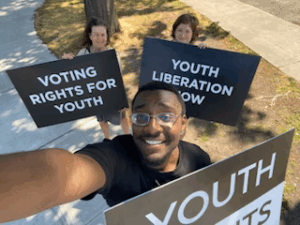Yesterday I was at a meeting of folks from across my local community who work with youth, including school personnel, nonprofit staff, government agency workers, and others. One topic discussed was what youth in the community should be invited to an event focused on listening to youth voice. As usual I raised a voice for nontraditional youth leaders, the kind who are inconveniently positioned in their schools and social lives to provide vital perspectives in any conversation about any topic. Those perspectives are often uncomfortable, unpredictable, and inconvenient, which ultimately only adds to their value.
You’ve seen “convenient youth voice” happen, or maybe you’ve done it yourself: A young person gets a position with an adult-led group, and suddenly they start dressing and talking like an adult. Adults often reward this behavior with recognition and encouragement, even foisting these “youth leaders” into more representative positions. In a way, adults are rewarding compliance: By acting like us, we are not threatened by them, and this must be acknowledged.
Paulo Freire wrote about natural community leaders who are taken from their neighborhoods for leadership training only to become ineffective afterwards. He explained this happens because of a mis-alignment of values between the community leader and the leadership teacher. However, minus the ability or desire to see the mis-alignment clearly, the community leader literally learns their way out of effectiveness by ultimately becoming a purveyor of cultural norms and values that are not their own. They literally lose touch., and for want of a better word, “sell out.”
This is what happens to a lot of youth leaders. Unconsciously, these young peoples’ desires to achieve and please adults alienates them from their peers. They inadvertently sell out by becoming “little adults” whose perspectives often align only with other little adults, and adults themselves.
Needless to say, my perspective wasn’t acknowledged to my satisfaction in the course of the meeting I was in yesterday. The perspective of a local school administrator who has “worked over a dozen years to lead youth forums of all kinds” was that the group select “the kids who know how to do it.” This seemed to me to be coded language for what I call “convenient youth voice,” which is a predictable, familiar, and acceptable type of behavior.
For me, this goes back to the idiom that, “If you do what you’ve always done, you’ll always get what you’ve always got.”
In order to meet the harsh realities facing our communities today we need to embrace inconvenient youth voice. This requires brave and bold and intentional new approaches that get the results adults want while meeting young peoples’ own desires to make their voices and actions heard and felt throughout the world we share.
I know that as a community we can rise to this challenge. Let’s go!
— This is Adam Fletcher’s blog originally posted at http://www.YoungerWorld.org/. For more see http://www.bicyclingfish.com/
Written by Adam Fletcher for CommonAction Consulting. It was originally posted at YoungerWorld.org. Contact us for more information by emailing info@commonaction.org or calling +1 (360)489-9680.






I really appreciatd this post – I think I might also fall into expecting the convenient youth voice pattern…and that concerns me. Good reality check.